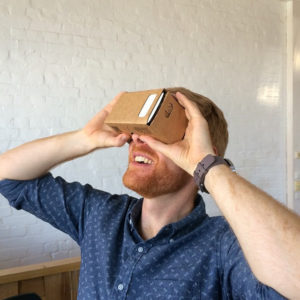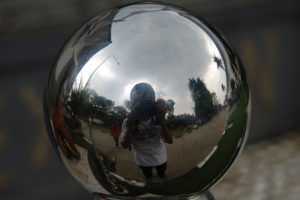
flickr photo by mkoukoullis shared under a Creative Commons (BY-NC) license
There are many exciting events lined up for Digital Innovation Week which began yesterday (Monday 28th November 2016) and runs through until Friday.
Today, we are looking at the Spherical Photography session which will be held on Friday 2nd December 2016, 10.00-11.00am.
The workshop for staff and students will be led by Dr Ben Jackson, who describes himself as ‘one of the library’s contributions to the new Sussex Humanities Lab project’.
What is spherical photography and what can it be used for?

Ben Jackson Research Fellow in Digital Humanities (Library)
You have probably seen spherical photography in action, on Google maps’ ‘street view’ for example (if you haven’t seen street view, have a look at their view of our campus). But as Ben explains, ‘this is now something which can be done on your phone or with a range of cameras that can create 360 degree images in a single click’.
Ben is particularly looking at ‘ways to deal with digital aspects of the archive and digitisation of heritage artefacts’ and wants to use the technology ‘in a heritage application where making virtual reality simulations would be too time consuming – so the ability to create it with a camera is very desirable’.
One project he is involved with is using the technology to add a multimedia component to poetry. He has found that ‘spherical photography turns out to be a very impressive way of doing this because of the ability to add narration and annotations to media content’.
What are the educational benefits of spherical photography?
We have written before about the expectations of a generation of ‘digital students’ and Ben believes that ‘new media types such as spherical photography are often the way for a generation that’s grown up with technology that wasn’t around when I was growing up …It means that I can engage in a different way’
‘For me, a lot of teaching is about telling the story which will inspire the students and bring the information that you’re wanting to present to them in a way that’s engaging.’
Digital tools that mix the virtual with the physical like this can bring locations and experiences to learners across distance and time.
Increasingly, museums and art galleries are using this technology to offer online views of their collections. For example, anyone with internet access can now explore the National Gallery.
What will be happening in the workshop?

flickr photo by Ikhlasul Amal shared under a Creative Commons (BY-NC) license
The session is aimed at all staff and students with no need for specialised technical knowledge beyond basic use of computers and mobile devices. It will provide an opportunity to play with tools like Google cardboard – though Ben emphasizes that the session will be much more than that.
He will be exploring where spherical photography came from, looking at some of the ways it has been used and creating some images to add to Google street view.
If you are interested in attending the session on Friday there may be places left – check out the online booking system in Sussex Direct.



[…] Read the full story by University of Sussex Technology Enhanced Learning Blog […]